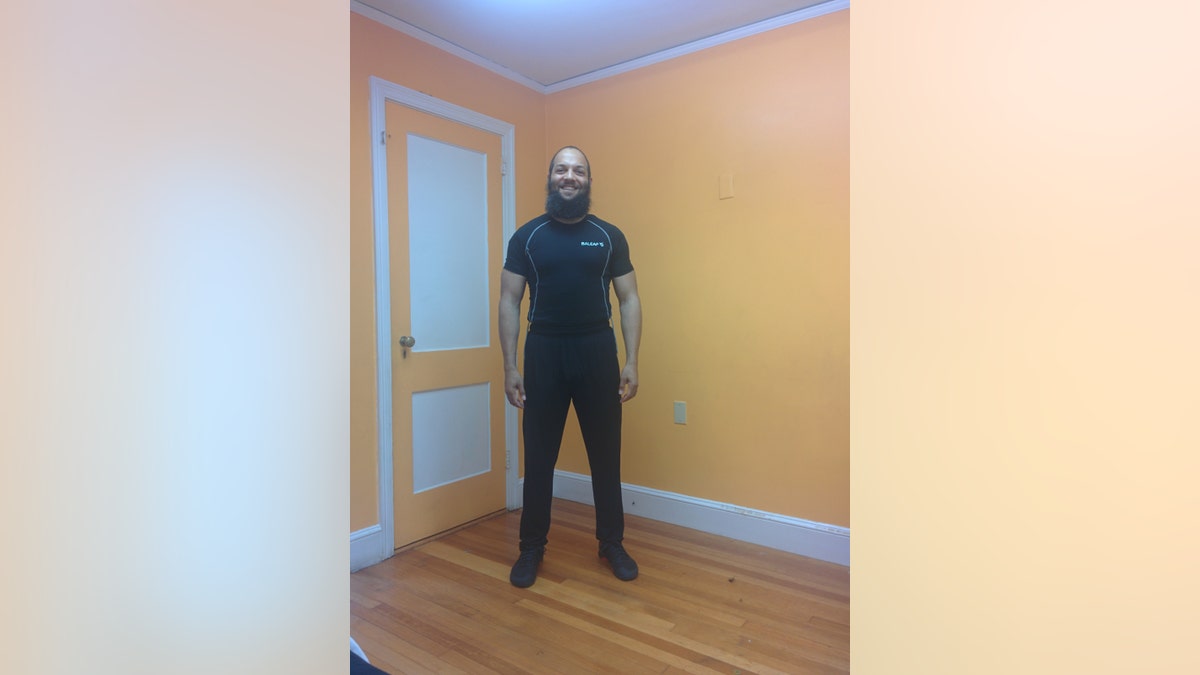
July 12, 2015: In this photo provided by Rabbi Yosef Kulek, Kulek poses for a photo in Hartford, Conn. a (AP)
CONCORD, N.H. – As an Orthodox Jew, Rabbi Moshe Gray may not need a cross. But CrossFit? That's another story.
Gray, the director of a Jewish center at Dartmouth College, hits the high-intensity core strength and conditioning program five days a week. And he's not the only campus rabbi getting in shape as he shores up spirits.
At Gray's urging, an international outreach organization for Jewish students launched a pilot program last fall to help campus rabbis and their wives get in shape. The 30 participants started by getting medical checkups and creating fitness goals, and Chabad on Campus offered online support groups and subsidized half the cost of a personal trainer for six months. Altogether, the participants lost 667 pounds, or an average of 22 pounds each.
Gray, 36, actually has gained weight — in the form of muscle — since his rising cholesterol levels prompted him to start working out a few years ago. Becoming a self-described "fitness freak" after years of inactivity wasn't easy: When his trainer challenged him to do 96 burpees in eight minutes, Gray managed 27 of the squatting and jumping exercises before he vomited. But that was a turning point.
"I said to myself, 'I am in such bad shape that if I can't do 27 burpees and not throw up, I need this more than I ever thought I needed this," he said.
It was actually Gray's trainer who sparked the idea for the fitness pilot program. Curious about Chabad Lubavitch — a Hasidic movement within Orthodox Judaism — he looked it up online and noticed image after image of overweight rabbis.
"You guys are really doing God's work," he told Gray, "But how are you effective doing this work while neglecting your bodies?"
Repeated research has shown that clergy members of all faiths are at a higher risk for obesity and other health ailments than other Americans. A study published in January in the journal Social Science Research identified several factors, including stress, long hours and low pay. Chabad on Campus rabbis have the added stress of having to fund-raise their own budgets, and many have large families.
That's certainly the experience of Rabbi Yosef Kulek, who has seven children and at least that many job descriptions leading Chabad at the University of Hartford in Connecticut.
"You're really a jack-of-all-trades. When I have to fill out what my job description is, is it rabbi? Is it executive director? Is it program director?" he said. "There's definitely a lot of stress in what we do, and you can definitely see it in my receding hairline and the gray in my beard."
Kulek, 38, had gained about 60 pounds since getting married and starting his career, and walking up a flight of stairs was enough to leave him winded. He eagerly signed up for the pilot program, and kept up with his workouts even after the six-month subsidy ended. In one year, he lost 22 pounds and dropped six pants sizes.
"What people don't quite realize right away is that Judaism and the Torah put a strong emphasis on taking care of your body and taking care of the gifts God gave us in this world," he said. "As clergy, it's important for us to lead by example."
Rabbis aren't the only ones looking to get into a shape that's a little less round.
Launched in 2007, the Duke Clergy Health Initiative is an $18 million, 10-year program to assess and improve the health and well-being of United Methodist clergy in North Carolina. After an initial survey found 41 percent of those clergy members were obese, compared to 29 percent in the state's overall population, the initiative created a two-year program that provides $500 grants, health coaching by phone and online help with stress management and weight loss.
The 1,100 participants were assigned to groups that started the program in 2011, 2012 and 2013. Researchers are still assessing the results, but in general, every group saw a decrease in risk factors associated with heart attacks and heart disease, stroke, diabetes, said Rachel Meyer, the initiative's director for program development and operations.
"They were grateful just to feel like someone cared," she said. "They're often giving out, giving out, giving out, but their social relationships aren't always such that they're being given to, and if they are, it's probably in the form of a casserole or a pie, that isn't going to help their waistline."
